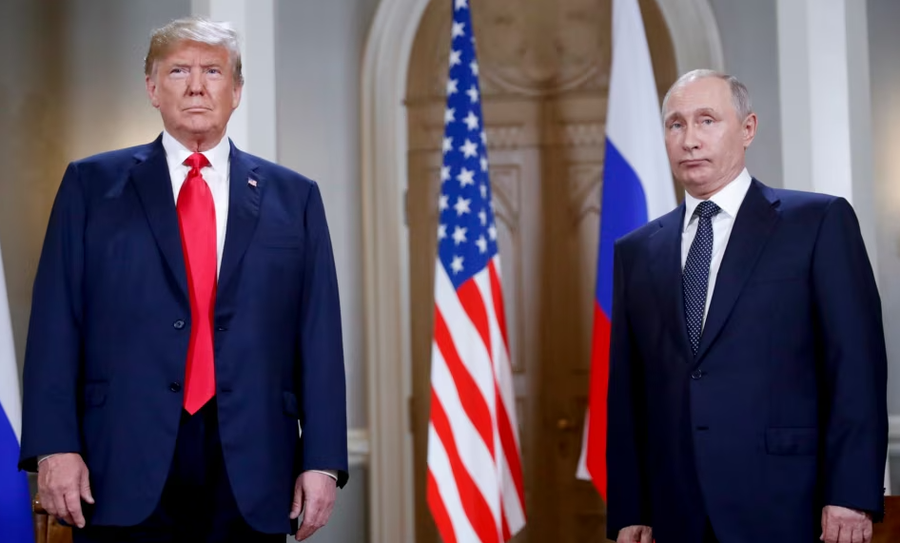
United States President Donald Trump has great influence over the next phase of the war in Ukraine, but how he plans to use it remains an open question.
Trump pledged, during his first address after his inauguration, on January 20, that he would be a "peacemaker", and promised during the election campaign to quickly end the war in Ukraine, which receives billions of dollars in US military aid.
But his more commercial approach to diplomacy has fueled fears that he could make a deal with Russian President Vladimir Putin to the detriment of Ukraine.
"There are still concerns that Trump will reach a deal with Putin, and then tell Ukraine that it must accept it or he will suspend American aid to Ukraine," said Marie Dumoulin, a former French diplomat at the European Council on Foreign Relations.
The new US president's strategy for ending the war is still taking shape, but analysts have said he has two broad paths ahead.
The first is to push Ukraine – which is already facing a shortage of fighters and donor fatigue – to the negotiating table, making vital military aid conditional and forcing it to sign a peace deal on unfavorable terms, a possibility that Kiev and most Western capitals consider the worst-case scenario.
The other is to intensify pressure on Russia with new sanctions and increased military support for Ukraine.
"At this point, every option is still possible," Dumoulin said.
Will Trump make a deal with Putin?
Both Putin and Ukrainian President Volodymyr Zelensky have signaled they are open to negotiations, but it is unclear whether Kiev and Moscow are willing to make compromises.
Putin initially wanted to take control of Kiev and install a government close to Moscow. The Kremlin also continues to insist on holding on to occupied parts of Ukrainian territory and limiting the size of the Ukrainian army.
This is unacceptable to Kiev, which is demanding the return of its territory and the full withdrawal of Russian forces. Zelensky, however, has said he might be open to freezing the fighting along the current front line in exchange for paving the way for Ukraine's membership in the North Atlantic Treaty Organization (NATO).
Trump is also trying to leverage his relationship with Putin, whom he has called a "smart" strategist in the past, and has said he plans to meet face-to-face with the Russian leader.
"From President Trump's perspective, you can't make a deal if you don't have some kind of relationship and dialogue with the other side. And we absolutely will create that in the coming months," Mike Waltz, Trump's national security adviser, said in an interview on January 12.
President Trump again mentioned his personal rapport with the Russian leader, speaking to reporters at the White House on January 20, saying he "gets along great [with Putin]. I hope he's interested in a deal."
But Trump has also expressed criticism, a signal that he may pull out both the carrot and the stick in an attempt to reach an agreement with Moscow.
"I think [Putin] is destroying Russia by not making a deal," Trump said. "I think Russia is going to be in big trouble."
Oleksandr Motsyk, Ukraine's former ambassador to the United States, told Radio Free Europe that Kiev should prepare for a host of diplomatic moves, and not fear a rapprochement between Moscow and Washington.
"In the first phase, Ukraine will talk to the United States, and Russia will talk to the United States," he said. "Then, the United States will look at the positions of both sides and, based on them, will be able to make proposals."
What tools does Trump have?
But as momentum for talks grows, Trump may find it difficult to bring Russia to the negotiating table.
Analysts say that, despite Russia's heavy losses on the battlefield, Putin believes he is winning in Ukraine and has little interest in backing down.
This could prompt Trump to try to take action – which could include imposing tougher sanctions on Russia's economy.
Before leaving office, President Joe Biden's administration imposed the most significant sanctions on Russian oil trade by any Western power to date. Trump could tighten them.
Scott Bessent, Trump's pick for Treasury secretary, said during his confirmation hearing on January 16 that he "100 percent" supports intensifying sanctions on Russian oil producers to bring Moscow "to the table," if Trump demands it.
During his Senate confirmation hearing, US Secretary of State Marco Rubio said that sanctions - both their implementation and lifting - could be part of discussions on ending the nearly three-year war.
While saying that both Russia and Ukraine must make "concessions" to reach a peace agreement, Rubio asserted that "sanctions and the lifting of sanctions" must "be part of this conversation in terms of finding... a solution."
Trump could also pressure Putin to participate in the talks, threatening to increase military support for Ukraine and change the dynamics on the battlefield.
It remains to be seen whether Trump will choose this path, especially considering his campaign promise to cut off financial support for Ukraine, and criticism of the Biden administration, during his first address after inauguration, for "unlimited funding for foreign border protection."
"Russia has never signaled a willingness to compromise," said former diplomat Dumoulin. "Trump has two main options: accept Moscow's conditions or try to change them."/ REL (A2 Televizion)











